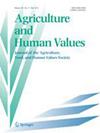Including animal welfare targets in the SDGs: the case of animal farming
Abstract
There is an increasing body of literature proposing to include animal welfare in the United Nations Sustainable Development Agenda. The main argument is the potential positive effect that improving the welfare of animals could have over the health and welfare of humans. However, recent literature suggests that the welfare interests of animals should also be considered. Based on these premises, an analysis of the practical implications of including animal welfare in the United Nations Sustainable Development Goals is granted. The aim of this study is to address this by applying the case of animals in the agriculture and aquaculture systems. Animal farming inherently affects the welfare of a substantial number of sentient animals while, the welfare of farmed animals has been connected to human wellbeing and several environmental issues. The study highlights the feasibility of incorporating the welfare of farmed animals into a future version of the SDGs. It does so by developing a model based on a set of human-focused (anthropocentric) and animal-focused (sentientistic) targets for each of the 17 goals. It has been argued that expanding the scope of the SDGs from anthropocentrism to sentientism creates a synergy between human and animal welfare and, on top of that, is progress towards sustainability.

 求助内容:
求助内容: 应助结果提醒方式:
应助结果提醒方式:


